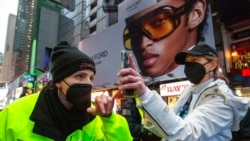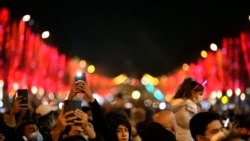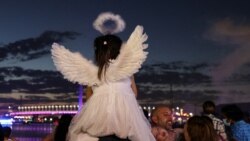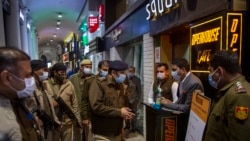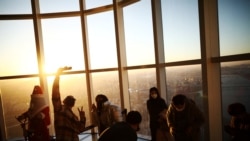As revelers said goodbye to 2021 and welcomed 2022, many countries around the world canceled or scaled down New Year’s Eve celebrations for the second year thanks to the coronavirus pandemic and the omicron variant’s spread.
New York City dropped its iconic ball at midnight in Times Square with only a fraction of the number of revelers the world has come to expect to see at the annual event. City officials allowed only 15,000 to attend the celebration and required them to wear masks and provide proof of vaccination.
New Year’s festivities in Chicago were not as boisterous this year as in previous years, after Illinois Governor J.B. Pritzker warned earlier this week that “Omicron and delta are coming to your party,” a reference to two coronavirus variants.
Large fireworks displays were called off in major cities, including London, Paris, Tokyo and Kuala Lumpur.
New York City was still planning to drop its iconic ball at midnight, but revelers will number only a fraction of the usual size, with entrance to the area capped at 15,000. Restrictions to attend the celebrations included mask wearing and proof of vaccination.
The number of daily new COVID-19 cases reported around the world topped 1 million for the first time since the pandemic began, according to a tally Thursday by Agence France-Presse.
While the omicron variant has put a damper on many festivities around the world, the decreased severity of the strain has offered people hope in the coming year.
In South Africa, where officials first raised alarm about the variant, authorities lifted a nighttime curfew, allowing celebrations to go ahead. Officials there said the country’s omicron wave had crested.
And Britain reported Friday that the risk of hospitalization with the omicron variant is about one-third that of the previously dominant delta variant.
Britain
London called off its riverside fireworks display because of the rapid spread of the coronavirus. However, the city’s Big Ben chimed at midnight for the first time since 2017, following more than three years of restoration.
France
Paris canceled its fireworks display at the Arc de Triomphe, and officials mandated that everyone older than 11 wear masks outdoors while walking on the Champs-Élysées and other city streets. Bars closed at 2 a.m.
Spain
New Year’s celebrations were canceled across much of the country. A scaled-down gathering took place in Madrid with crowds limited to less than half the size of a normal year.
Russia
In a state televised address broadcast just before midnight in all of Russia’s time zones, President Vladimir Putin honored Russians who died from the coronavirus and offered words of support to those who lost family and friends. Russia's government coronavirus task force has reported more than 300,000 COVID-19 deaths, but its state statistics agency puts the figure at more than double that.
Japan
Celebrations were banned in Tokyo’s Shibuya entertainment district, and Prime Minister Fumio Kishida addressed the nation on YouTube, asking citizens to wear masks and limit the number of people at gatherings.
Australia
Hours before the start of Australia’s celebrations, health authorities announced a record number of COVID-19 infections – 32,000, many in Sydney. Festivities, though, continued as planned. The world-renowned fireworks display from the Sydney Harbor Bridge and the Sydney Opera House ignited the night sky with vibrant colors, while people in boats watched from the water, ushering in the new year.
New Zealand
Although the country has not reported any community spread of the omicron variant, New Zealand authorities canceled several fireworks displays, including the one atop Auckland’s Sky Tower. In place of the tradition, Auckland celebrated with light displays projected on the tower and on other city landmarks.
South Korea
Seoul’s annual New Year’s Eve bell ringing was canceled for the second consecutive year because of an increase in COVID-19 cases. Officials instead broadcast a pre-recorded video of the bell ringing on television and online. The event had traditionally drawn tens of thousands of spectators, and last year’s cancellation was the first since the ceremony’s start in 1953.On Friday, officials also announced that strict social distancing rules would be extended for two weeks.
India
Nighttime curfews and restrictions forced millions in India to celebrate the new year from their homes. In Mumbai, authorities banned all New Year’s celebrations, including at hotels, restaurants, bars and pubs, indoors or in open spaces. Curfews were imposed for restaurants. New Delhi’s authorities also enforced similar measures. However, in other cities restrictions were not as strict, including in Goa and Hyderabad, which did not have night curfews.
Indonesia
The Indonesian government’s ban on celebrations meant many citizens rang in the new year in a much quieter manner, with evenings spent at home. Fireworks displays, parades and large gatherings were prohibited in Jakarta, where authorities also closed 11 roads that typically draw large crowds for the holiday. Restaurants and malls remained open, but with a curfew.
Vietnam
In Vietnam, fireworks displays and celebrations were also canceled. Authorities in Hanoi closed central streets, and in Ho Chi Minh City, audiences were banned from watching live countdown performances, which were instead shown on social media.
Hong Kong
Hong Kong hosted its first New Year’s Eve event since 2018, because of the pandemic and political issues, with an open-air concert featuring local celebrities including the popular boy band Mirror, and about 3,000 in attendance. Despite the celebration, authorities appealed to citizens on Friday not to attend New Year’s celebrations but did not impose cancellations because the territory has not reported cases of the omicron variant.
China
In Shanghai, the government canceled several events, including the annual light show along the Huangpu River in the city center, which typically attracts hundreds of thousands of attendees. In Beijing, there were no public festivities planned, and popular temples were either closed or remained open with limited visitor access. Temples in the eastern cities of Nanjing and Hangzhou also canceled traditional New Year’s Eve “lucky bell ringing” ceremonies and asked the public not to visit.
Thailand
Under strict COVID-19 safety measures, Thailand’s authorities allowed New Year’s Eve parties and fireworks displays to continue. Despite the emergence of the omicron variant, authorities hoped restrictions would mitigate its spread while allowing people to celebrate, in an effort to aid its damaged tourism sector. New Year’s Eve prayers, typically hosted in Buddhist temples around the country, took place online.
The Philippines
Following highly destructive Typhoon Rai two weeks ago, New Year’s Eve celebrations in the Philippines were severely hampered. Tens of thousands were without necessities, and half a million homes were destroyed. The death toll has surpassed 400, and 82 people remain missing.
South Africa
While it was the first to discover the omicron variant, South Africans were able to ring in the new year with traditional festivities. The country announced that many restrictions, including a nighttime curfew, would be lifted ahead of the holiday because, authorities said, the fourth wave of COVID-19 had peaked.
Some information in this report came from The Associated Press, Reuters and Agence France-Presse.





